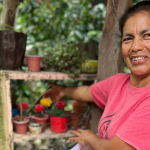Learn, share, act. Repeat.
 Ending the water crisis is no small endeavor. Likewise, there are no small parts to be played. No acts too small to move the needle. Like the hummingbird in the ancient story from the Quechua people who carries drops of water to put out a great forest fire, ending the water crisis is going to take all of us doing all that we can.
Ending the water crisis is no small endeavor. Likewise, there are no small parts to be played. No acts too small to move the needle. Like the hummingbird in the ancient story from the Quechua people who carries drops of water to put out a great forest fire, ending the water crisis is going to take all of us doing all that we can.
Omar Sanchez is doing his part.
Omar Sanchez pulls a ring of keys out of his rainbow satchel, unlocks the gate that surrounds his community’s water tank and ushers our visiting group into the fenced area. As a two-term president of the El Pastal community water board, Omar knows every inch of the water system. His is no small role. And he is doing (more than) his part.
Omar hovers nervously nearby as we all take our turn climbing the shaky wooden ladder to the top of the tank. For Omar, trips to the top of the big blue trapezoidal tank are routine. The tank is cleaned every two weeks, and water board members trained by EOS rotate in the role of plumber, each taking their turn maintaining and managing the system as required.
A housing of sorts sits atop the tank – a remnant of a previous chlorination system, complicated and unreliable and abandoned. A simple-to-use EOS ADEC in-line chlorinator has since replaced the relic, and on this day, Circuit Rider, Johny, confirms the community’s water quality with a quick field test.

From our perch atop the tank, Omar points towards the dense forest that surrounds us, indicating the direction of the water source that, through a buried conduction line, gravity fills the vessel below our feet. The source, Omar says, is but a mile away. Do we want to see it? Do we want to follow him? We do!
We want to hear his stories; we want to know his experience; we want to walk a mile in his shoes. Those shoes lead us up a muddy red clay road. We shimmy between two posts and under barbed wire to leave the path and enter the thickness of the forest. Despite Omar’s machete trail-blazing at the front of the line suggesting rapid overgrowth, this too is a route traveled on the regular to maintain the water source infrastructure and the surroundings. We dodge roots to keep our footing, we grasp tree trunks to steady our descent, and we clutch vines to stay upright.

The water source, its own little oasis, is surrounded by trees – a sign of a healthy watershed, reducing runoff and filtering pollutants that would otherwise wind up contaminating the source.
Proudly gesturing with his machete, Omar notes the trees that have been cleared of vines to protect them from being strangled out. Watershed preservation clearly a source of satisfaction and part of Omar’s legacy, he tells of the water board’s work to relocate families living in the watershed to reduce contamination from livestock waste and of the recent reforestation effort completed in partnership with EOS.

The El Pastal water system serves Omar’s family’s home and 141 others.”I feel a responsibility for my community,” Omar shares, as we retreat from the forest and return to the red clay road.
Learn, share, act. Repeat. This is unmistakably Omar’s MO. With EOS resources and Circuit Rider support, Omar is walking the talk. Just like the hummingbird in the ancient story, Omar is doing what he can to help solve the water crisis.




